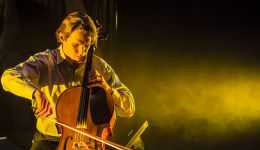Scott P




Instruments: Guitar, Cello, Bass Guitar
Styles: Classical, Jazz, Pop, Rock, Blues, Folk, Country, R&B, Gospel, Funk, Spirituals, Reggae, Swing, Soul


Scott P



Instruments: Guitar, Cello, Bass Guitar
Styles:
Classical, Jazz, Pop, Rock, Blues, Folk, Country, R&B, Gospel, Funk, Spirituals, Reggae, Swing, Soul
Where I Teach:
Ages Taught: 5-80
MM, Berklee College of Music, Contemporary Performance (Cello)
BA, Harvard University, Music
2017 - Peer Recognition Award for Contemporary Performance (Berklee)
2017 - Principal Cellist of Valencia Film Orchestra (Spain)
2016 - Recipient of John Knowles Paine Traveling Fellowship for Music (Harvard)
2007-2010; 2012 - Principal Cellist of Georgia All-State Orchestra
I am a multi-genre cellist who is passionate about helping students reach their full potential as musicians. I have been classically trained since the age of three, and studied classical theory and composition at Harvard University. However, towards the end of my college experience I began to learn jazz and blues and ended up pursuing a Master's degree in Contemporary Performance. I now practice both contemporary and classical equally, and am motivated to see the cello expand its possibilities in the realm of today's music. In addition to teaching, I am a session musician and sideman in both classical and contemporary styles, and also perform my own music.
I began teaching a younger cello student while I was in high school, serving as an intermediary between him and his primary teacher. There, I was just an extra pair of ears, but it helped me to focus on my own technique and how to most efficiently play my instrument. Thus, I believe classical methods of teaching are most effective for getting a student off the ground and running on the cello. But I have also taught general music classes to young students in South Africa, and used well-known songs to help train the students' ears. Utilizing standard methods for actual instrument training complemented by utilizing popular music for musicianship training proves effective.
I believe in training students both as instrumentalists and as overall musicians. Thus, beginning cello students will start with the Suzuki method to get basic technique down. Then, as a student improves, solo repertoire will be introduced from both the Suzuki method and other sources. Once a student has reached a state of proficiency, I will cater my teaching instead to the style that the student prefers. We can continue in classical music, or transition to contemporary styles. Regardless, lessons will be catered so that the student is able to appreciate the music they play and end up playing the music they want to play.
As I mentioned in my Methods statement, I am more interested in seeing a student become a great musician as opposed to just a great instrumentalist. Emotion and interpretation are a big part of a student's musicality, and I will focus on that as a student progresses. In my own journey I have played a number of different musical styles and all have given me a greater appreciation for music. I would like to transfer that same love to my students! I also do not believe on harping perfection. I want a student to be the best they can be, but some of the greatest moments in live performance come from mistakes, and it's important that students know that.

